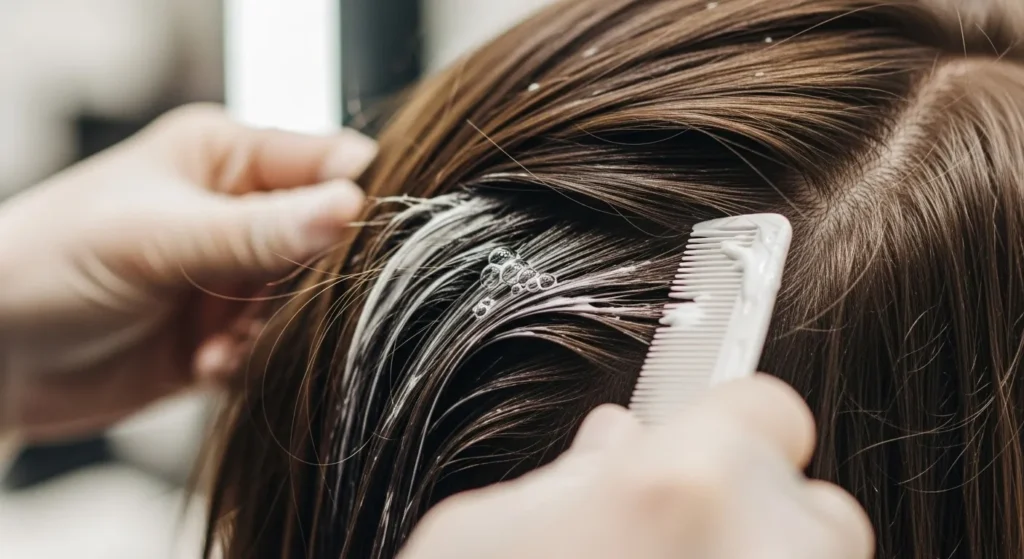Does hair botox cause hair loss? If you’re concerned that this trendy smoothing treatment may lead to thinning hair, you’re not alone. Hair botox is often marketed as a miracle repair solution, but some users report increased shedding or breakage afterward.
In this blog, we’ll break down the science, expert opinions, and safety tips you need to know. Learn whether hair botox is right for you, how to avoid damage, and what to do if you’re already experiencing hair loss.
What Is Hair Botox and How Does It Work?

Definition and Purpose of Hair Botox
Hair botox is a deep conditioning treatment designed to smooth, repair, and revitalize damaged hair. Despite the name, it doesn’t contain Botulinum toxin like traditional Botox for the skin. Instead, it’s called “botox” because it works to “fill in” damaged areas of the hair shaft, making strands look fuller and smoother.
Common Ingredients in Hair Botox Treatments
Hair botox formulas typically include a mix of:
- Collagen
- Keratin
- Vitamins (B5, E)
- Botanical oils (e.g., argan, coconut, macadamia)
- Amino acids
These ingredients aim to restore moisture, seal split ends, and improve manageability.
How It Differs from Traditional Botox and Keratin Treatments
| Feature | Hair Botox | Keratin | Botox (Cosmetic) |
|---|---|---|---|
| Purpose | Repair hair | Straighten hair | Reduce wrinkles |
| Contains Formaldehyde? | No | Sometimes | No |
| Targets | Hair shaft | Hair shaft | Facial muscles |
Does Hair Botox Cause Hair Loss? Separating Fact from Fiction
Scientific Explanation: Can Hair Botox Harm Hair Follicles?
Hair botox works on the hair shaft, not on the scalp or follicles. Therefore, it shouldn’t directly cause hair loss. However, improper use or low-quality formulas may lead to breakage or scalp irritation, which can result in temporary shedding.
Temporary Shedding vs. Permanent Hair Loss
Some individuals report increased hair fall after hair botox. This is often due to:
- Product buildup on the scalp
- Improper application techniques
- Heat damage during sealing
These usually lead to telogen effluvium, a temporary shedding phase, not permanent hair loss.
Myths and Misconceptions Explained
Myth: Hair botox causes permanent balding
Fact: No evidence properly applied hair botox damages follicles or causes irreversible hair loss.
Myth: All hair fall after hair botox means the treatment failed
Fact: A mild increase in shedding can occur due to scalp sensitivity or the hair’s natural cycle.
Common Side Effects of Hair Botox Treatments
Scalp Sensitivity or Allergic Reactions
- Itchy or red scalp
- Tingling or burning sensation
- Flakiness or dryness
Pro Tip: Always perform a patch test before applying the full product.
Breakage or Dryness After Treatment
- Excessive use of heat during treatment can weaken strands
- Some low-quality products can dry out the hair shaft
When Side Effects Indicate a Serious Issue
- Persistent scalp pain
- Clumps of hair falling out
- Rash or blistering
Recommendations for Safe Usage
- Choose salons with trained professionals
- Avoid if you have active scalp inflammation or hair shedding
- Ask to see the ingredient list before treatment
Guidelines for Sensitive or Thinning Hair
- Opt for gentle formulations without harsh preservatives
- Space out treatments (no more than once every 3–4 months)
- Strengthen hair with topical biotin or scalp serums beforehand
Who Should Avoid Hair Botox?
Individuals with Active Hair Loss Conditions
- Alopecia Areata
- Telogen Effluvium
- Androgenetic Alopecia
These conditions require medical evaluation, not cosmetic treatments.
Recent Hair Transplant Patients
Hair transplant recipients should wait at least 6–12 months before using any chemical hair treatments.
Those with Scalp Conditions or Allergies
- Psoriasis
- Seborrheic dermatitis
- History of allergic reactions to cosmetic products
How to Minimize Hair Damage from Hair Botox
Tips for Choosing a High-Quality Product
- Avoid brands with formaldehyde or parabens
- Choose products labeled sulfate-free and hypoallergenic
- Look for clinically tested or dermatologist-approved formulas
Professional Application vs. DIY Risks
DIY kits may seem budget-friendly, but often lead to overprocessing, uneven results, or exposure to unsafe chemicals.
Proper Aftercare and Post-Treatment Hair Routine
- Use sulfate-free shampoos
- Limit heat styling for at least a week
- Deep condition regularly
Safe Alternatives to Hair Botox for Damaged Hair
Deep Conditioning Masks and Protein Treatments
These nourish the hair shaft without altering its structure.
Keratin-Free Smoothing Treatments
Look for botanical-based smoothing systems that avoid harsh chemicals.
Natural Oils and Serums That Nourish the Scalp
- Argan oil
- Jojoba oil
- Rosemary-infused scalp serums

FAQs About Hair Botox and Hair Loss
Does hair botox damage hair follicles?
No, it acts on the hair shaft, not the follicles.
How long does hair botox last?
Typically 2–4 months, depending on hair type and maintenance.
Can I use hair botox if I have thinning hair?
Only if approved by a specialist. People with active hair loss should avoid it.
Is hair botox better than keratin for damaged hair?
Hair botox is usually gentler and formaldehyde-free, making it safer for some users.
Can hair botox reverse hair loss?
No. It’s a cosmetic treatment and does not regrow hair.
Final Verdict: Is Hair Botox Safe for Your Hair Health?
Hair botox is generally safe when applied professionally and on healthy hair. However, for individuals with sensitive scalps, thinning hair, or underlying hair loss conditions, it may do more harm than good. Always consult a certified hair specialist before undergoing any cosmetic treatment.
Concerned about shedding or thinning after hair botox?
Book a consultation with Dr. Rana Irfan, ABHRS-certified hair restoration surgeon in Islamabad. Get expert guidance tailored to your hair type and condition.
